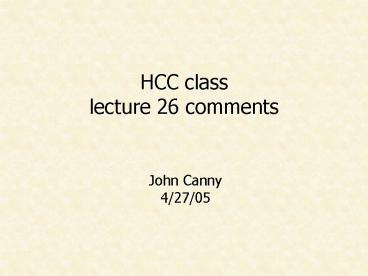HCC class lecture 26 comments PowerPoint PPT Presentation
1 / 13
Title: HCC class lecture 26 comments
1
HCC classlecture 26 comments
John Canny4/27/05
2
Administrivia
3
Goffman
- Probably the best known researcher in identity
and how we manage it. - Formerly president of the American Sociological
Institute, but also considered an outsider to
sociology for many years.
4
Roles
- In order to manage our identity and sustain a
self-image that others wont challenge to often,
we cultivate a ritualized life. We - Play out the role we are comfortable with.
- Strive a little to improve, but
- We attend to the feedback from others around us.
- Seek out familiar persons and situations that
will re-validate our position and status.
5
Ritual
- Ritual is a perfunctory, conventionalized act
through which an individual portrays his respect
and regard for some object of ultimate value to
that object of ultimate value or its stand-in. - Once upon a time, we did this mostly to deities.
Now we do it to each other. - Ritual is a critical form of social exchange. It
leverages the recipients own positive self-image
to trigger reciprocation.
6
Ratification
- Ritual associated with change in status or role,
e.g. marriage or promotion. - They promulgate knowledge of the recipients new
status throughout their social group. - The rewards are often proportionate to the degree
of doubtfulness of the new status, e.g. a new
beard, or a persons physical appearance after
surgery or a serious disease.
7
Remedial Interchanges
- When an individual offends, they can give an
account - Offer various arguments that the action did not
occur. - Argue that circumstances made the act necessary.
Includes shifting blame to the accuser. - Argue for passive or unintentional
participation in the act. - Reduced competency, e.g. too much to drink, had a
bad day, pressure, depressed, deadline, - Didnt know what was going to happen,
8
Remedial Interchanges
- Apologies The individual separates themselves
into two parts the part that did the act, and
the part that distances itself from it. - The individual can therefore take the side of
prosecutor against themself, allowing others to
defend them.
9
Games
- Idealized social encounters, a kind of natural
laboratory for perfect society. - The uncertainty of the outcome makes it genuinely
interesting to be involved (as player or
spectator). - Its also interesting to the extent that the
players display their powers. - Games delicately balance too serious with not
serious enough.
10
Tribalism
- Games may be deliberately staged to cultivate
tribal bonds, e.g. in schools or universities.
The teams are aligned with institutional
boundaries, so that one institution is self and
the other is the other. - These differences are even more effective when
they amplify other differences, like class or
regional differences. But they must not break
the barrel. - Symbolic distance from the actual sources of
conflict are important.
11
Projection
- A device whereby people can project their own
experiences which are too difficult to deal with,
into a game or virtual reality mediated by
dolls. - Or a patient who was non-communicative who
gradually started expressing her grief through
hand gestures.
12
Character contests
- Games may also morph into contests of display
rather than participation. - That is, the game is not about the actions within
the game, but about the displays the players make
while playing it.
13
Discussion Topics
- T1 List some of the roles that you play in your
work and home life. What situations change how
you play them? What rituals do you use? - T2 In what situations are you aware of multiple
roles? i.e. of the distance between yourself and
the character you are playing?

